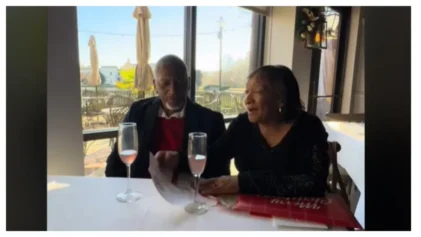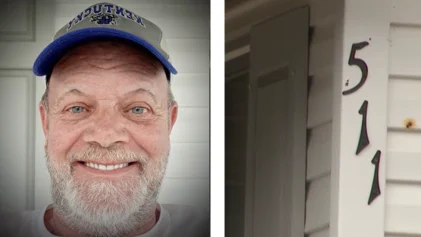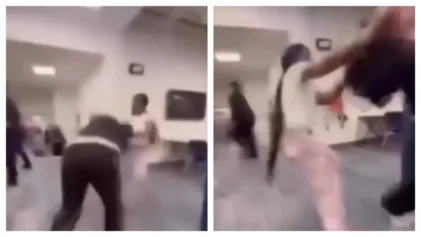For the first time in more than 20 years, Terrence Flowers of Columbus, Georgia, is casting his vote in an election.
“It’s an amazing feeling to be able to vote,” Flowers said last weekend. “It’s one of those things that you don’t really realize how important it is ’til you don’t have it.”
Flowers didn’t have that right for ten years. He spent two years in a Georgia prison after being convicted on felony drug charges. He spent the past eight years on probation. He says he’s finally “off paper” and is eligible to vote.
“I feel like my vote matters!” Flowers exclaimed.
“Off paper” is a non-traditional way of saying off probation.
According to Georgia state law, once a convicted felon is no longer serving his sentence, on parole or probation and has paid all fees, they are considered “off paper,” which restores their voting rights.
“It’s hard as a Black man when you’re clean as a whistle with no charges, no felonies, but it is 10 times harder when you have a record,” Flowers explained this past Saturday, Oct. 3, at his Columbus gym, 4.0 Fitness. “So, just being off probation and starting the process to get my rights back, it means a lot to me.”
Tonza Thomas is a part of the Columbus, Georgia-based organization Ground Game, that’s helping people register to vote.
“It’s like voter suppression all over again,” Thomas said at Flowers’ gym. “And second-chancers shouldn’t be included in voter suppression.”
She says there’s usually some confusion surrounding whether felons can vote when they’re released from prison.
“The Department of Corrections, when they are releasing folk, they don’t give them a simple piece of paper to say the remainder of your time and this is what you have to pay in restitutions and fees,” she said.
Those fees can include fines, court costs and probation or parole fees that are attached to convictions.
“If our Black men knew that they could register and vote, we would take on Georgia and we would take it over,” said Thomas.
By the numbers, according to the National Conference of State Legislatures, in 21 states, including states like Georgia, Texas and North Carolina, felons lose their voting rights while incarcerated, on parole and/or probation. Those rights later can be restored — some automatically — with the payment of fines and fees required in some cases.
In the District of Columbia, Maine and Vermont, felons never lose their right to vote, even while behind bars.
In 16 states, including Indiana, Michigan and Pennsylvania, felons lose their voting rights while incarcerated and at release receive automatic restoration.
In 11 states, such as Mississippi, Florida and Alabama, felons lose their voting rights indefinitely for some crimes. They may need a governor’s pardon for voting rights to be restored.
Would-be voters who might be affected by such laws should be sure to check with their state on its specific policies regarding felon voting rights.
Flowers says the day he makes it to the polls will be a proud day for him and his family, especially his mother, JoAnn Oliver.
She says her son always knew how vital it was to vote, but his rights were stripped away.
“I took my child down to the police station and turned him in,” Oliver said. “And when they put the handcuffs on him, I about lost it.”
She says she turned him in so police wouldn’t hurt him when they found him.
“I was just hoping and praying that his journey, whatever he had to do, would eventually soak in, and, praise God, it did,” Oliver exclaimed. “I’m so proud of him.”
Oliver says voting has always been important to her, so she made sure she passed that along to her family.
“Once my children became of age, I told them the importance of voting, but like he said, he made his own obstacles, but praise be to God, those are all straightened out now,” Oliver said. “So, it’s going to be a rejoicing thing for us to go and cast that vote.”
She says his life decisions brought him to where he is today.
He now owns a gym and video production business.
“I’m in such a better place mentally, physically,” Flowers said. “Forty-seven, I don’t look too bad for an old man.”
Flowers says he hopes his story helps convicted felons learn that one day their voices can be heard.
“So if we’re paying tax dollars, putting something into the system and being productive and providing jobs, we definitely should be able to vote out here in any election,” said Flowers.
To learn more about Georgia’s voting rights for felons, go to gavotes.org, the Georgia Justice Project website at gjp.org, or the National Conference of State Legislatures website at ncsl.org.


